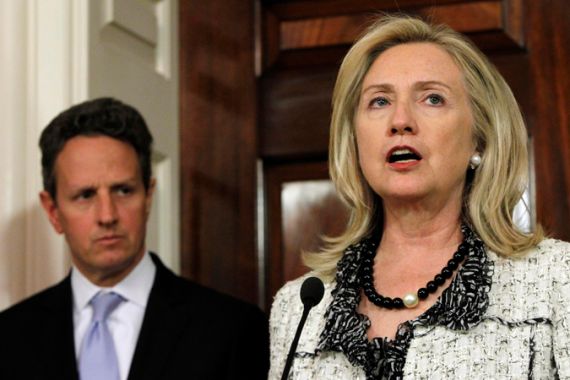Iran hit with new sanctions over IAEA report
Britain, US and Canada impose new financial and energy sanctions on Iran in response to UN nuclear watchdog findings.

The United States has announced a new set of sanctions targeting Iran’s energy and financial sectors in an effort to apply greater pressure on Tehran to halt its suspected nuclear weapons programme.
The new sanctions announced on Monday, which were co-ordinated with the United Kingdom and Canada, built on elements of previous sanction efforts.
The US named Iran as an area of “primary money-laundering concern,” a step designed to dissuade non-US banks from dealing with it; blacklisted 11 entities suspected of aiding its nuclear programmes; and expanded sanctions to target companies that aid its oil and petrochemical industries.
However, the US stopped short of targeting Iran’s central bank, a step that could have cut it off from the global financial system, sent oil prices skyrocketing and jeopardised the economic recovery in the US and Europe.
“Any and every financial transaction with Iran poses grave risk of supporting those activities, so financial institutions around the world should think hard about the risks of doing business with Iran,” Timothy Geithner, the US treasury secretary said in a joint appearance with Hillary Clinton, the US secretary of state, to announce the steps.
The UK also ordered all British financial institutions to stop doing business with their Iranian counterparts, including the Iranian central bank.
Canada said it would ban the export of all goods used in Iran’s petrochemical, oil and gas industry and “block virtually all transactions with Iran,” including with its central bank, with an exception for Iranian-Canadians to send money home.
Iran: Sanctions ‘in vain’
An Iranian foreign ministry spokesman said on Tuesday that the new sanctions would have “no impact and be in vain.
“If our people feel that enemies want to deprive them of their rights by threatening, bullying and adopting illegal and irrational methods, they will pursue the path that they have taken more united and more determined than ever,” said Ramin Mehmanparast.
Russia also dismissed the sanctions, calling them unacceptable. “Such practices … seriously complicate efforts for constructive dialogue with Tehran,” a foreign ministry spokesman said.
While not taking concrete actions, France urged the European Union and other nations to immediately freeze the assets of Iran’s central bank and to suspend purchases of Iranian oil, steps it called “sanctions on an unprecedented scale.”
The series of announcements were in response to a November 8 International Atomic Energy Agency report that presented intelligence suggesting Iran had worked on designing an atomic bomb and may still be secretly carrying out related research.
The range of unilateral steps planned by Western powers reflects the difficulty of persuading Russia and China not to veto further measures at the UN Security Council, where they have supported four previous sanctions resolutions.
Mehdi Ghazanfari, Iran’s trade minister, said sanctions were hitting the Iranian economy but warned western countries they were harming their own interests.
“Sanctions are a lose-lose game in which both sides make a loss. If they don’t invest in our oil projects, they will lose an appealing market,” Ghazanfari told a news conference before the announcement by the western countries.
Iranian President Mahmoud Ahmadinejad has often said sanctions have little effect and in some cases make the economy stronger by making Iran find domestic solutions to challenges.